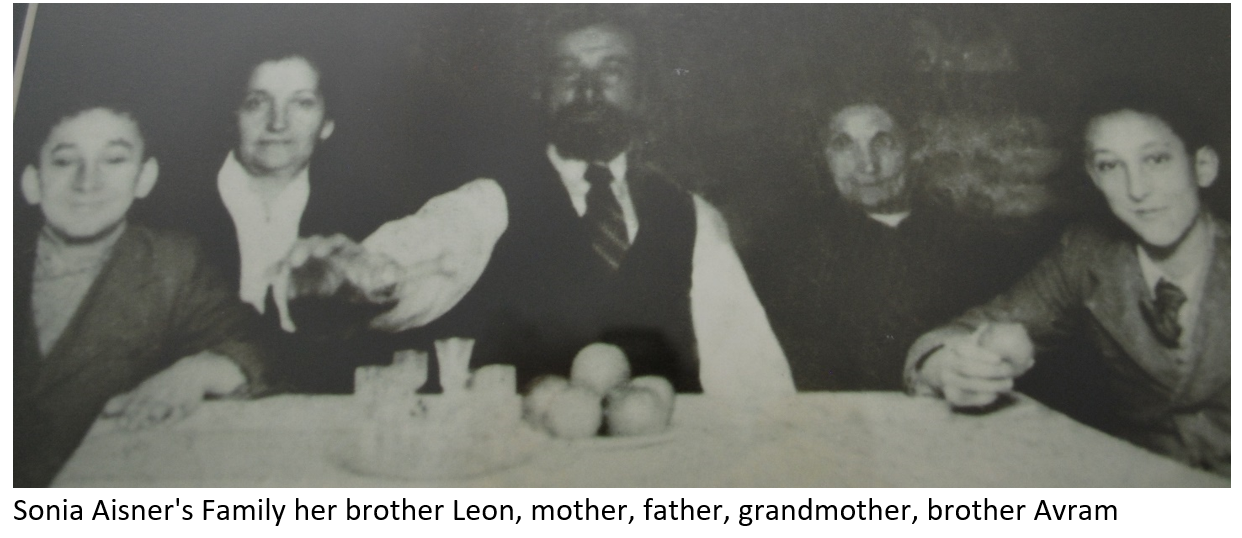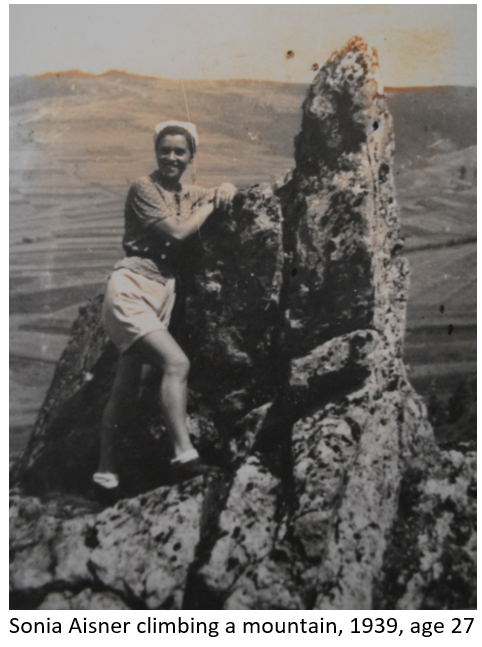Sonia Aisner
"We must never forget what happened. We must be watchful to ensure nothing like this ever happens to anyone else in the world."
Name at birth
Sonia Bicz
Date of birth
09/20/1912
Where did you grow up?
Lodz, Poland
Name of father, occupation
Berek Bizc,
Merchant. He was defrauded of his family property and then became a merchant broker. He was a man of integrity who was known to be a man of his word and trusted by Jews and Gentiles alike.
Maiden name of mother, occupation
Devora Yakabovitz,
Homemaker
Immediate family (names, birth order)
Parents, five daughters and two sons: Miriam, Sonia, Lodzia, Cesia, Sara, Avram, Leon
How many in entire extended family?
Thirty plus, approximately
Who survived the Holocaust?
My mother and my four sisters survived as well as a few cousins. My mother's brother, who fled to England at the beginning of the war, also survived.
We lived in Lodz on Mariaszynska Street, #10, I think. My father’s mother’s maiden name was Lieberman. In 1939 before the Germans came to Lodz, my father fled to Russia after hearing that the Germans were killing the men, he later returned. My father was religious. He was kind, tall and handsome; he dearly loved his children.
I grew up in a traditional religious Jewish home. On Friday night, my father would go to synagogue and my mother would prepare the home for Shabbos, the Sabbath, with gefilte fish, wine, and home baked Chala (braided bread). It was a nice life.
I was the second oldest daughter. I finished public school, the equivalent of elementary school, and won a scholarship to go on to the Gymnasium. This was like a high school but it was not free. I loved reading and learning; I wanted to be a doctor. My family did not have money and were not able to send me to college. Besides that, in Poland at that time, there was a strict quota for Jews and very few Jews were admitted to college.
I went to work in a textile factory where I was a clerk in the office and handled payroll, billing receivables, and bookkeeping. I lived at home with my parents and siblings and gave my entire salary to the family.
My grandmother’s cousin was a Jewish writer in Lodz, his last name was Broderson. He wrote books in Yiddish and also in the United States. His wife was an artist in the Lodz Theater.
The Germans made a ghetto in Lodz. They threw out all the Jews from all over the city and confined them to a restricted part of the town. First they removed the wealthier Jews and confiscated their homes and possessions. They brought in people from other countries to the ghetto later on. They brought in the Lodz Jews, then the Warsaw Jews, and then the Piotrkow Jews and resettled them all in the Ghetto. It was overcrowded and often several families had to share rooms. There was little food and few jobs were available. Many people got sick and died. There was no medicine. The first transport out of the ghetto was to Auschwitz. They killed the Jews in Lodz.
The ghetto was walled in with barbed wire. We could not get out. In the morning we heard shooting and blood ran in the streets. My family was forced to move several times as the Germans appropriated our living quarters as well as most of our possessions. All of our valuables were confiscated as were family heirlooms and photographs.
My family, consisting of nine people, was forced to live in one small room. There was a lot of hunger and starvation. I tried to find an office job, but none were available. I went to work as a nurse trainee at the hospital on Wesola Street. I worked twelve hour days and was paid in Ghetto Script which was redeemable for a ration of one loaf of bread and a few grams of margarine and sugar every eight days. No clothes were available.
We all lived in constant terror of deportations to a death camp or being shot in the street. One day I came to work and found that all the patients were gone; they were transported to Auschwitz during the night. I went home. I later found another job working for the food distribution department for the Ghetto government. At first, I worked in a bakery as a cashier, but soon I was promoted to the main office and did clerical work.
In August of 1944, I was deported to Auschwitz.
In August of 1944, I was sent by locked cattle train car from the Lodz Ghetto to Auschwitz with my mother, and my sisters Miriam, Sara and Lodzia. My sister, Cesia, had fled to Russia earlier.
We were in transit for a full day without food or water. Upon arrival, our hair was shaved. We were placed naked in a room with showers and examined by a doctor who proclaimed all of us, except my mother, fit for slave labor. My mother was put in the death line.
My sister, Lodzia, pulled her out of the line and told the guard that she was to be in work line, and saved her life. We all survived the first selection. We were each given a long dress, wooden shoes, and were put to work.
The men were transported separately to Auschwitz, my father and my two brothers, Avram and Leon. We never saw them again.
After Auschwitz, I was sent to Freiberg, a sub camp of Flossenburg camp, with my mother, Miriam, Sara, and Lodzia. Once again, we were forced into a freight train for the journey.
I don't remember most of this journey because I was very ill with Typhoid and had a high fever. We spent the entire winter in Freiberg where we were forced to work twelve hour days in a munitions factory. We slept in a factory converted to barracks on wooden bunks.
We were given a sack and straw to make ourselves mattresses. The bunks were infested with bedbugs and fleas and we were constantly tormented by bug bites.
There was only an open shower without windows in the courtyard, and we were not allowed to use it. Many of us would sneak into it to wash in the freezing water in spite of the prohibition.
Our daily food ration during that time consisted of one slice of bread, a cube of margarine, a teaspoon of marmalade, a watery soup, and a little sugar. Our factory was near a town which was an Allied bombing target. During the bombardments, we were locked in the factory and abandoned by the guards.
In April of 1945, my mother, sisters and I were sent to Mauthausen. We were scheduled for extermination, but Berlin fell and the ovens in Mauthausen were shut down.
I helped several of the other inmates who were doctors, to set up a hospital to treat the inmates. In May of 1945, after we were liberated by the Allies, I volunteered to stay at the hospital and assist the American medical authorities. The hospital was closed in July of 1945 but since my mother and sisters were ill, I stayed with them until the end of October, 1945.
Name of Ghetto(s)
Name of Concentration / Labor Camp(s)
Where did you go after being liberated?
As the war was ending, the Russians, English and Americans were chasing the Germans out. My mother, sisters and I returned to Lodz to see if my father and brothers survived. The Poles were very anti-Semitic. They said to us, “Weren’t there enough ovens to get rid of all the Jews?” I married my husband in July of 1946. I had my first child in October of 1947 and my second, in May of 1950. I stayed home to raise my children. In December, 1956, I left Poland and went to Israel with my husband and my two daughters. There, I worked as a nurse at the Hadassah Hospital in Beer-Sheva for 2½ years.
When did you come to the United States?
September, 1960.
Where did you settle?
We settled in Detroit, Michigan.
How is it that you came to Michigan?
We had family living in Michigan.
Occupation after the war
Nurse in Beer Sheva, Israel. I worked as a Nurse Aide in Michigan until my retirement.
When and where were you married?
We were married in Lodz, Poland in 1946
Spouse
Sidney Aisner,
Electrician
Children
Two daughters: Celina Aisner and Anya Aisner
Grandchildren
Eric Ellenoff, Jeffrey Ellenoff, and Justin Figot
What do you think helped you to survive?
The hope that I would see my father and brothers again. I was the mother figure and took care of my mother and sisters. We relied on each other.
What message would you like to leave for future generations?
We must never forget what happened. We must be watchful to ensure nothing like this ever happens to anyone else in the world.
Interviewer:
Charles Silow
Interview date:
07/23/2012
Experiences
Survivor's map


